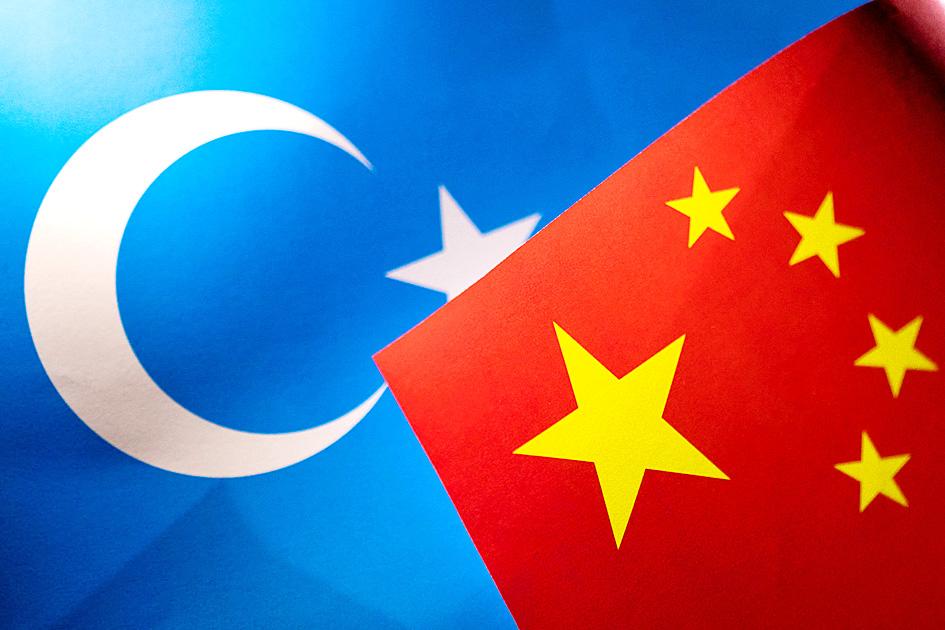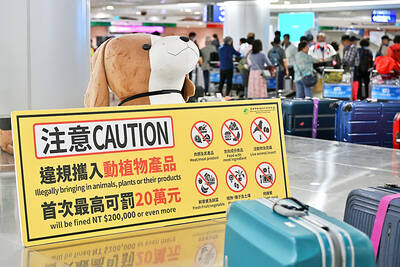The fashion industry has been told it must wean itself off cotton from China’s Xinjiang region, as a new law comes into force giving US border authorities greater powers to block or seize goods linked to forced labor in China.
The Uyghur Forced Labor Prevention Act (UFLPA), which came into force yesterday, assumes that any product partly or wholly made in Xinjiang is linked to the region’s labor camps.
Since 2017, the Chinese authorities have detained as many as 1 million Uighurs and subjected them to forced labor.

Photo: Reuters
The fashion industry would be particularly affected by the new law. About 20 percent of the world’s cotton comes from China and 84 percent of that comes from Xinjiang.
The UFLPA has designated cotton a “high priority for enforcement,” along with tomatoes and polysilicon. Any fashion brand exporting to the US would also be subject to it and failure to provide adequate certification or supply-chain details could result in fines of up to US$250,000.
However, the ban poses big problems for the industry.
Liv Simpliciano of Fashion Revolution said Xinjiang cotton is ubiquitous in supply chains.
“The difficulty is that at the ginning stage [when fibers are separated from their seeds], cotton from disparate locations is mixed together, making it impossible to trace the provenance,” she said.
A number of technology companies, among them TrusTrace, SupplyShift and TextileGenesis, plan to use blockchain and artificial intelligence to trace supply chains for fashion labels. Brands can use the platforms to log all their purchase orders and certifications.
To prove conclusively an absence of Xinjiang cotton, brands would need to show a “complete digital chain of custody, where a brand is fully in control of its supply chain from the farm onwards,” TrusTrace chief executive officer Shameek Ghosh said.
While fashion has historically been notoriously cagey about its supply chains, there is now a strong business case for full transparency.
A report by the financial think tank Planet Tracker said that implementing traceability “can improve net profit on average by 3 to 7 percent for apparel companies.”
That is before any fashion stock has been impounded by border forces.
Because of General Data Protection Regulation, TrusTrace is not alerted if Xinjiang cotton is found in a brand’s supply chain.
“Only the brand is informed,” Ghosh said. “They wouldn’t use a platform like this [if they’d be exposed].”
However, blockchain technology is not without its problems.
“If you’re relying on brand discretion to ratify their sourcing practices, then what’s the efficacy going to be?” Philippa Grogan of Eco-Age asked.
“Also, blockchain technology is not regulated, so it creates a risk environment — the lack of regulatory oversight makes it vulnerable to market manipulation,” she said.

UKRAINE, NVIDIA: The US leader said the subject of Russia’s war had come up ‘very strongly,’ while Jenson Huang was hoping that the conversation was good Chinese President Xi Jinping (習近平) and US President Donald Trump had differing takes following their meeting in Busan, South Korea, yesterday. Xi said that the two sides should complete follow-up work as soon as possible to deliver tangible results that would provide “peace of mind” to China, the US and the rest of the world, while Trump hailed the “great success” of the talks. The two discussed trade, including a deal to reduce tariffs slapped on China for its role in the fentanyl trade, as well as cooperation in ending the war in Ukraine, among other issues, but they did not mention

Japanese Prime Minister Sanae Takaichi yesterday lavished US President Donald Trump with praise and vows of a “golden age” of ties on his visit to Tokyo, before inking a deal with Washington aimed at securing critical minerals. Takaichi — Japan’s first female prime minister — pulled out all the stops for Trump in her opening test on the international stage and even announced that she would nominate him for a Nobel Peace Prize, the White House said. Trump has become increasingly focused on the Nobel since his return to power in January and claims to have ended several conflicts around the world,

REASSURANCE: The US said Taiwan’s interests would not be harmed during the talk and that it remains steadfast in its support for the nation, the foreign minister said US President Donald Trump on Friday said he would bring up Taiwan with Chinese President Xi Jinping (習近平) during a meeting on the sidelines of the APEC Summit in South Korea this week. “I will be talking about Taiwan [with Xi],” Trump told reporters before he departed for his trip to Asia, adding that he had “a lot of respect for Taiwan.” “We have a lot to talk about with President Xi, and he has a lot to talk about with us. I think we’ll have a good meeting,” Trump said. Taiwan has long been a contentious issue between the US and China.

Taiwan’s first African swine fever (ASF) case has been confirmed and would soon be reported to the World Organization for Animal Health (WOAH), Minister of Agriculture Chen Junne-jih (陳駿季) yesterday. The Ministry of Agriculture’s Veterinary Research Institute yesterday completed the analysis of samples collected on Tuesday from dead pigs at a hog farm in Taichung and found they were ASF-positive. Animal and Plant Health Inspection Agency Animal Quarantine Division chief Lin Nien-nung (林念農) said the result would be reported to the WOAH and Taiwan’s major trade partners would also be notified, adding that pork exports would be suspended. As of Friday, all samples